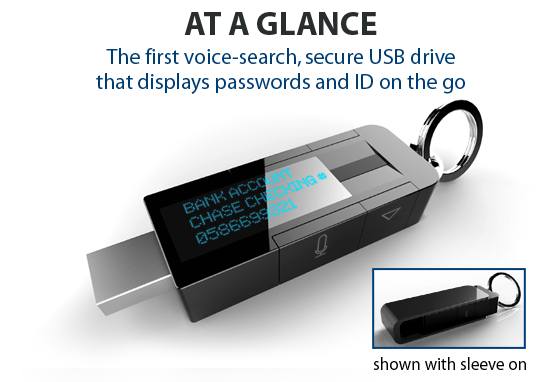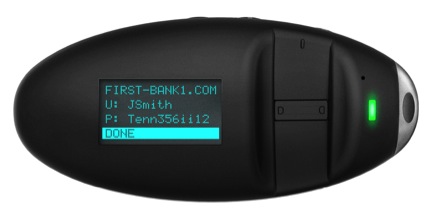
In February 2013, a company called Arkami launched a Kickstarter campaign for a gadget called myIDkey, a USB drive with a built-in display and fingerprint reader that would auto-fill passwords and login information when attached to a computer. The project was funded by March 22 with nearly half a million dollars from its backers—almost triple the original goal. MyIDkey's prototype had won awards at the 2013 Consumer Electronics Show, it received coverage from almost every major tech news outlet, and it pulled in another $3 million in startup capital during later investment rounds.
Like all Kickstarter projects posted after Kickstarter changed its rules to make creators more accountable, Arkami had a functional myIDkey prototype before launching its campaign. The only real risk appeared to involve acquiring the right parts in enough time to ship the myIDkeys on deadline. According to Arkami's Kickstarter pitch:
The "Designs" are complete, patents filed, component suppliers selected, the manufacturing process is defined, the CM [contract manufacturer] chosen so all we need is your support in this project as we size the first myIDkey production run and ship product in September 2013. Please make a pledge and receive your myIDkey!
Delivery of the final gadget was promised by September 2013. Yet over the next 18 months, Arkami and its product became a case study for mismanagement. Only a small number of myIDkeys have actually shipped, and numerous backers who received one complained about failing buttons and freezing displays. In the end, all $3.5 million was spent without much to show for it.
Feature creep
Almost as soon as funding ended, the product began to change. Arkami promoted executive chairman Benjamin Chen to CEO so that he could be more hands on with the project and watch "details day-to-day." Chen and his team began revising their prototype, eventually falling down a rabbit hole of revisions.
MyIDkey's delays seemed to stem from the team realizing that the product, as prototyped, was woefully insufficient. "In building a breakthrough device, we’ve faced engineering challenges," stated project update #12 on July 4, 2013. At that time, the team decided to switch from an A3 to an A5 ARM processor, as well as a new operating system, memory, hardware encryption, a different Bluetooth chip, and a larger redesigned case.
"These were all changes we had to make to deliver the functionality promised and to meet the production schedule," the update said. “'It’s way too #$#@^$& long' 'That’s unacceptable!!' 'Forget the feature creep, keep it small.' Painfully, we could visualize all your comments. We agree! So our phenomenal electrical engineering team has been working overtime to solve this dilemma," wrote Arkami. Unfortunately, the changes made meant to keep production on schedule ended up creating far more delays.

Over the next few months, the company kept adding features, like the ability to scroll the screen with the fingerprint reader and hopped repeatedly between component suppliers and production manufacturers (none of which the company would name, for security reasons, it said). Arkami also released versions of iOS and Android apps to go with myIDkey.
However, midstream overhaul and supplier changes didn't necessarily make the device more functional. According to project update #47, a few myIDkey devices shipped to backers in April 2014, though Arkami CEO Chen admitted to Ars that the great majority of the project's 3,927 backers have yet to receive theirs, and complaints that rolled in from backers on the Kickstarter project suggest that many units were shipped broken or quickly stopped working. A reporter from the OC Register newspaper was invited to try out the myIDkey in May 2014 and also reported a "very buggy" product similar to the few "faulty" devices that were eventually shipped to backers.
As Arkami and Chen continued to tinker, backers began looking for someone to blame. One backer, Nick Lloyd, pointed Ars to Chen's work history, which includes almost twenty years working in tech and serving for a time as an advisor on due diligence for GE Capital. However, in those twenty years, two of the companies for whom he served as CTO were bought out, both by Publicis Groupe. The rest of his background is in advertising and web applications, with a brief stint for a loyalty app that rewards users for watching certain TV shows. Likewise, one of Arkami's other founders, Mark Thacker, had a background almost exclusively in services before myIDkey; only a third founder, Tareq Risheq, appears to have a background in actual hardware: between 2002 and 2004, he helped see a PDA through manufacturing.
Chen sounded anguished in his most recent private update to backers on June 17, when he wrote that all the company's sources of funding had dried up, allegedly because the "investor syndicate could not agree on financing terms." Chen said he had to lay off the entire company, including himself. "I told the team that I would immediately focus my efforts to try and find additional capital from new investors and or find a strategic partner for us," Chen wrote. He described the company as "not dead yet but in deep hibernation."
But when Ars reached Chen by phone, he seemed nonplussed by his own company's failure. "Do you know what the percentage of completion is for Kickstarters in general for technology-based startups?" Chen asked. "Probably 85 percent of all startups fail."
Chen insisted that myIDkey is yet to rise up again. "We're very close to making some big announcements," Chen told me. The "legal nature" of his position prevented him from specifying further, he said, and he would only confirm that it would be less than a year before things may get off the ground again.
Funding a vision
While the commonly traded wisdom about Kickstarter is that backers are paying to support a vision, not necessarily to buy a product, Kickstarter's terms do actually hold project creators accountable for delivering a product if they promise one. Before creators launch their projects, they see a warning that reads, "if your project is successfully funded‚ you are required to fulfill all rewards or refund any backer whose reward you do not or cannot fulfill. A failure to do so could result in damage to your reputation or even legal action on behalf of your backers."
Such legal actions do occasionally happen. In May, Washington state Attorney General Bob Ferguson filed a lawsuit against Ed Nash and Altius Management. Altius successfully funded a project for Asylum Bicycle playing cards with $25,000 from 810 backers. The company promised to deliver the product by December 2012, but as of April 2014, one backer wrote that nearly a year had gone by without an update from Altius.
Even with Kickstarter's prototyping requirements, projects are still capable of evaporating in the months following the end of funding. What Kickstarter, backers, project creators, and legal intermediaries still have yet to figure out is what to do when a project doesn't turn out the way everyone planned.
Listing image by MyIDkey
reader comments
186